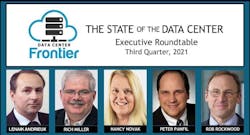Executive Roundtable: The Chip Shortage and Data Center Supply Chain
Welcome to our 24th Data Center Executive Roundtable, a quarterly feature showcasing the insights of thought leaders on the state of the data center industry, and where it is headed. Our Third Quarter 2021 roundtable offers insights on four topics: The semiconductor shortage and the state of the data center supply chain, how recent weather disasters are impacting site selection and operations, the opportunities and challenges created by “software-defined everything,” and technologies that can drive long-term sustainability solutions.
Here’s a look at our distinguished panel:
- Rob Rockwood, the President of Sabey Data Centers, one of the largest-privately-held data center providers in the U.S.
- Peter Panfil, the Vice President of Global Power at Vertiv, a leading provider of data center power and cooling equipment.
- Nancy Novak, the Chief Innovation Officer at Compass Datacenters and Advisory Council member for Infrastructure Masons.
- Lenaik Andrieux, the General Manager for EMEA at Kohler Power Systems, a leading maker of power equipment for data centers.
The conversation is moderated by Rich Miller, the founder and editor of Data Center Frontier. Each day this week we will present a Q&A with these executives on one of our key topics. We begin with a look at our panel’s take on trends in data center rack density and cooling.
Data Center Frontier: The semiconductor shortage is among the examples of how the supply chain can impact business timetables. How would you assess the state of the data center supply chain, and how it has impacted the industry?
PETER PANFIL, Vertiv
Peter Panfil, Vertiv: The supply chain issues that resulted from the pandemic are being addressed, but it will take time for the necessary capacity to come online. In the interim, we need to work together to buy ourselves that time. From a manufacturer’s perspective, we integrate a lot of chip-based intelligence into our systems, so we’ve had to work closely with our suppliers to understand how component and material availability would affect production schedules and new product introductions, and then proactively communicate with our customers so there are no surprises.
Everyone is aware of the issues, which are global and not limited to our industry, so planning, communication and collaboration become the keys to making the best of a difficult situation. From an operator’s perspective, it’s more important than ever to make investments that can extend equipment life, such as preventive maintenance and remote monitoring.
NANCY NOVAK, Compass Datacenters and iMasons
Nancy Novak, Compass Datacenters and iMasons: While we’ve seen increased costs in some areas for things like steel, the data center industry has probably been less effected by supply chain issues. While the chip shortage may ultimately ripple through to impact the availability of components like PDUs, ATS units and generators, it has not resulted in supply problems for data center building components anywhere near the extent that is has the things like servers that reside within the buildings themselves.
If there is a supply issue from a data center construction perspective, it is found on the labor side of the equation. Contractors and sub-contractors, like many businesses around the country are continually searching for qualified personnel. While there are a number of factors contributing to these shortages, the simple fact is that we are simply not doing enough to find and train the volume of people we need in the skilled trades.
LENAIK ANDRIEUX, Kohler Power Systems
Lenaik Andrieux, Kohler Power Systems: Tense is the word that comes to mind for global supply chains currently. Recent months have seen sharp increases in raw material (copper, iron…) combined with serious production capacity limitations for key industries supplying the data center market. This has included semiconductors, but more broadly and significantly the transportation industry itself. It is leading to key components shortages, increased costs, uncertainty of project execution, increased lead-times and ultimately uncertainty in the execution of data center projects. This is a tough situation in an industry that has innovation, speed of execution and volume leverage as part of its DNA.
So how did we get here, beyond the simple of fact of very significant growth in data markets? This time the supply chain tension impacts many other markets, such as the automotive industry to name an obvious one, and the world economic growth in general. Since the 2007 financial crisis, the data industry has been the fastest growing market when more traditional markets like oil and gas, mining, and infrastructure have been soft or even depressed.
These markets are generally recognized as strong profitability drivers for the manufacturing footprint. Over this last 10 to 15 years, this has led a number of key suppliers to rationalize their production and supply chain capacities. At the same time that some operations were reducing, an increased percentage of production was made available to the data center industry. Over the last 18 months, the COVID phenomena has accelerated this gap between the world’s hunger for data and more traditional industries and markets. The recovery for all has been sudden, though, leading to the current tension.
So what to do? This does not seem to be a short term situation. The first obvious answer is that increased transparency and collaboration through the supply chain is a must. Sharing project plans much earlier with all key players enables supply positions, and guarantees better planning and project execution. It also matters who you are partnering with. Financial strength is extremely relevant here. Deep expertise and focus in the data center industry seems critical, rather than choosing more generic multi-industry entities that may have to share and allocate their production capacity with all other markets. Collaboration and focus could be the winning formula.
ROB ROCKWOOD, Sabey Data Centers
Rob Rockwood, Sabey Data Centers: Semiconductors, having found their way into equipment beyond just computers, are affecting the data center supply chain at several levels. For projects initiating in the second half of 2021, the industry is experiencing schedules extended by 5% to 10%. I expect, as suppliers adjust to the situation, that schedules will have returned to pre-shortage levels by the end of 2022.
Having learned from this situation, suppliers will ensure that the supply chain shows greater resiliency, with project schedules decreasing to slightly below pre-shortage durations by 2023.
NEXT: How recent weather disasters are impacting data center site selection and operations.
Keep pace with the fact-moving world of data centers and cloud computing by following us on Twitter and Facebook, connecting with DCF on LinkedIn, and signing up for our weekly newspaper using the form below:
About the Author





